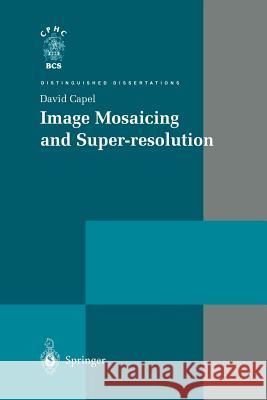Image Mosaicing and Super-Resolution » książka
Image Mosaicing and Super-Resolution
ISBN-13: 9781447110491 / Angielski / Miękka / 2012 / 218 str.
This book investigates sets of images consisting of many overlapping viewsofa scene, and how the information contained within them may be combined to produce single images of superior quality. The generic name for such techniques is frame fusion. Using frame fusion, it is possible to extend the fieldof view beyond that ofany single image, to reduce noise, to restore high-frequency content, and even to increase spatial resolution and dynamic range. The aim in this book is to develop efficient, robust and automated frame fusion algorithms which may be applied to real image sequences. An essential step required to enable frame fusion is image registration: computing the point-to-point mapping between images in their overlapping region. This sub- problem is considered in detail, and a robust and efficient solution is proposed and its accuracy evaluated. Two forms of frame fusion are then considered: image mosaic- ing and super-resolution. Image mosaicing is the alignment of multiple images into a large composition which represents part of a 3D scene. Super-resolution is a more sophisticated technique which aims to restore poor-quality video sequences by mod- elling and removing the degradations inherent in the imaging process, such as noise, blur and spatial-sampling. A key element in this book is the assumption of a completely uncalibrated cam- era. No prior knowledge of the camera parameters, its motion, optics or photometric characteristics is assumed. The power of the methods is illustrated with many real image sequence examples.











